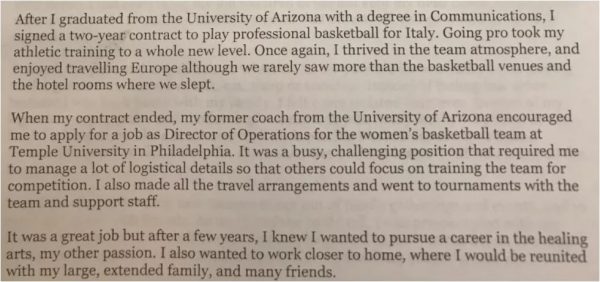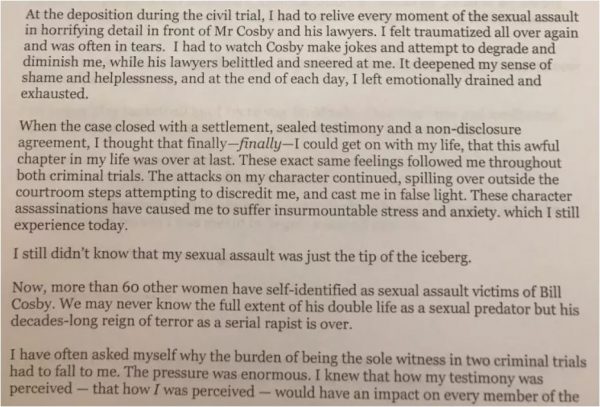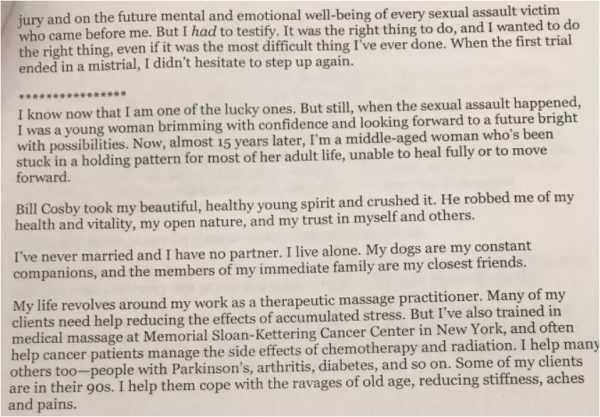.
.
.
We’re going to be talking a lot about sexual harassment in these dwindling days before the first ballots arrive for the general election, not only because it’s in the news regarding Bill Cosby, Brett Cavanaugh, and others, but because anonymous supporters of Young Kim have been working hard to make it an issue in her race against Gil Cisneros. For today, though, we’ll focus only on one topic — the “victim impact statement” made by Andrea Constand, after her recent court victory over Cosby prior to his sentencing. It’s bracing and harrowing and will, I hope, give us some needed perspective on the horrors at issue. The statement, photographed sheet-by-sheet by a reporter for the feminist site Jezebel, from which our cover photo is a detail of a much larger photo, follows the blown up detail below of the face of Andrea Constand.
I’ve gone back and forth about whether to include the details of the assault from Constand’s testimony here, as recounted by Slate, because calling them “triggering” is an understatement. So I’m going to put them here into a very light-colored type font that you can highlight if you want to read the words and skip quickly over otherwise:
The two had met through Cosby’s alma mater, Temple University, where Constand was on the basketball staff. After a year and a half of cordial friendship, they met at Cosby’s home in suburban Philadelphia. According to Constand, the comedian gave her three blue pills to help with the stress she was feeling over an upcoming career shift. “These will help you relax,” he said, according to her testimony. “Put ’em down, they’re your friends. They’ll take the edge off.” When Constand asked if they were herbal supplements, she said, Cosby nodded and gave her a glass of water with which to swallow them. A few minutes later, “I began to slur my words, and I also told Mr. Cosby that I had trouble seeing him, that I could see two of him,” Constand testified, according to a report from Billy Penn. Cosby told her to relax and brought her to a couch. She lost consciousness.
When Constand was “jolted awake,” she said on the stand on Tuesday, Cosby was assaulting her. “I felt Mr. Cosby’s hand groping my breasts under my shirt. I also felt his hand inside my vagina moving in and out. And I felt him take my hand and place it on his penis and move it back and forth,” she said. “In my head, I was trying to get my hands to move or my legs to move, and I was frozen. I wasn’t able to fight … I wanted it to stop.” After it was over, and she could move her body again, she says she moved into Cosby’s kitchen, where he gave her a muffin and some tea, then exited his house without saying anything to him, because “I felt really humiliated, and I was really confused.”
Some time later, according to Constand, she returned to Cosby’s home to demand to know what was in the pills he gave her. “Mr. Cosby looked at me and said, ‘I thought you had an orgasm, didn’t you?’ ” Constand said. “And I said, ‘I did not. I just want to know what you gave me.’ ” After a while, she decided he wasn’t going to give her an answer and left.
(There is no question, by the way, over whether Cosby would give women alcohol and Quaaludes when he wanted to have sex with them. He admits to it in his 2005 deposition in Constand’s civil suit, which led to the initial settlement in the civil case. Cosby’s defense was not that no sexual activity took place, but that Constand, who at the time of his assault on her was 30 to his 65 and a sexually active lesbian, took drugs and engaged in sex acts with him consensually.)
The reporter for Jezebel puts Monday’s statement, which preceded Tuesday’s sentencing — 3-10 years in jail for Cosby — into context:
In the statement, Constand recounts loss of appetite, exhaustion, nightmares, and an “overwhelming” sense of shame in the weeks after the assault. “Bill Cosby took my beautiful, healthy young spirit and crushed it. He robbed me of my health and vitality, my open nature, and my trust in myself and others.”
A nondisclosure agreement kept Constand and her family silent for many years about what happened. The criminal proceedings have been her few chances to say what Cosby did to her that night. Before the Harvey Weinstein story broke and before #MeToo trended, Constand went through much of what the entire country is just now talking about.

Close-up of Andrea Constand, who won her sexual assault suit against Bill Cosby, and whose victim statement is found below. (Magnified detail of photo from Jezebel.com (link above).
Like many civil libertarians, I’m leery of victim impact statements for reasons spelled out in a State story that linked to the Jezebel story.
Research has shown that victim impact statements can make sentencing juries angrier and less careful about sentencing defendants to death; some advocates have argued that coloring the facts of the case with a victim’s emotions violates the defendant’s right to due process. The sympathy a jury (or in Cosby’s sentencing, a judge) can muster for victims also varies based on class, race, and markers of respectability.
So yes, there’s a real question as to whether a convicted criminal’s sentence should be determined in large, or even small!, part by how compelling a story a victim can tell — which in turn is a function of how “relatable” that victim is for a judge or jury. (Maybe Todd Spitzer, over the years Orange County’s most avid advocate of victim’s statements, and I should debate it sometime.) But that question is not that compelling as it relates to this particular case. Slate continues (emphasis mine):
But in this case, where Constand was the only one of Cosby’s five dozen alleged victims whose claim didn’t fall outside the statute of limitations, no punishment on the table—certainly not the three to 10 years in prison he was sentenced to on Tuesday—could have adequately fit his crimes. This amplified the agonizing pressure Constand has faced over the past couple of years. Where other trials for serial sexual abusers have included testimony from multiple victims—such as Larry Nassar’s, in which 204 survivors got to share impact statements over nine days—Constand had to stand alone, with the weight of Cosby’s entire alleged history of assault bearing down on her testimony. “I have often asked myself why the burden of being the sole witness in two criminal trials had to fall to me,” her statement reads. Constand’s written inventory of the effects of Cosby’s cruelty functions as a small offering of closure, if not justice, to the other women who will never get a chance to hold him accountable in court.
But, also like many civil libertarians, sexual assault cases seem to be the exception that proves the rule. We can all probably imagine the horrors of being swindled out of our savings, having our car stolen, being robbed at gunpoint, and so on, the individual differences in our reactions to such crimes probably don’t differ all that much. The differences may lie in whether one loses a lot or a little, how much one feared for our safety, etc. This stuff is hard to imagine — especially hard, I’d expect, for males who generally don’t face consequences like this in response to reporting a crime:
When sexual assault cases are adjudicated, accusers are inevitably smeared by those who victimized them. Constand writes that Cosby’s legal team and his defenders in the media called her “a gold-digger, a con artist, and a pathological liar.” In a victim impact statement, no one can refute a survivor’s own interpretation of the harm she’s suffered or challenge her recollection of pain. Observers get to read or hear, uninterrupted, about the lasting punishment she endured before her assailant has served a single day in jail. It’s the only part of the entire proceeding over which she has complete control.
Whatever we think of victim impact statements generally, we should appreciate it when they open our eyes — individually and collectively. Be prepared for that to happen to you now.
Before continuing, I’m going to say what we are NOT going to do here. We are not going to say that Melissa Fazli’s, or anyone else’s, story of their victimization has to be as vivid, as severe, as disgusting, or as long-lasting in its impacts in order to be considered credible. Cosby’s assault on Constand and its impact on her is an example, not a standard.
What it should do, though, is to make everyone take this sort of action, and accordingly this sort of charge, really seriously. That includes Cisneros; it includes Fazli herself; it includes Young Kim and the people paying for ads depicting Cisneros as a shadowy sexual assailant; it includes me, it includes you the reader; it includes every voter.
As I’ll note tomorrow, it does not seem that Young Kim and her supporters are taking it seriously — in that they are trying to turn what was at worst a sexual overture outside of any formal organizational relationship into a violent “demand” for sexual access. We’re either going to get Young Kim on the record over what she thinks that the ad being blasted on her behalf is saying — and whether she herself asserts that the concern it expresses is valid — or we’ll make her wish that she were capable of giving the public straight answers.









*So does Bill get to go to the same center and do his time, as Jerry Sandusky?